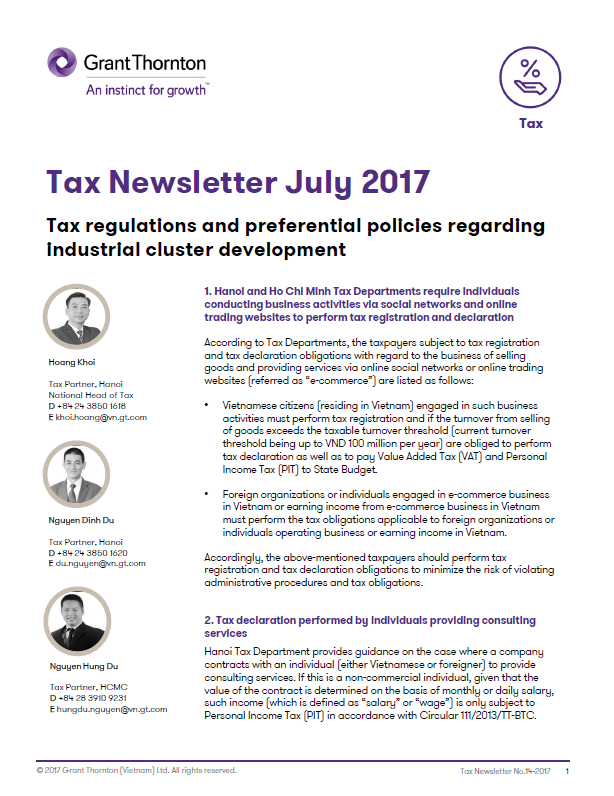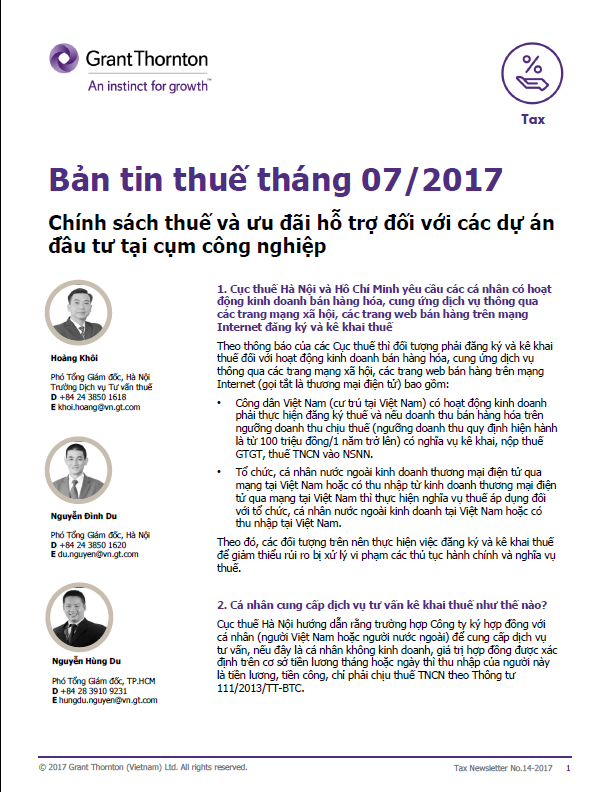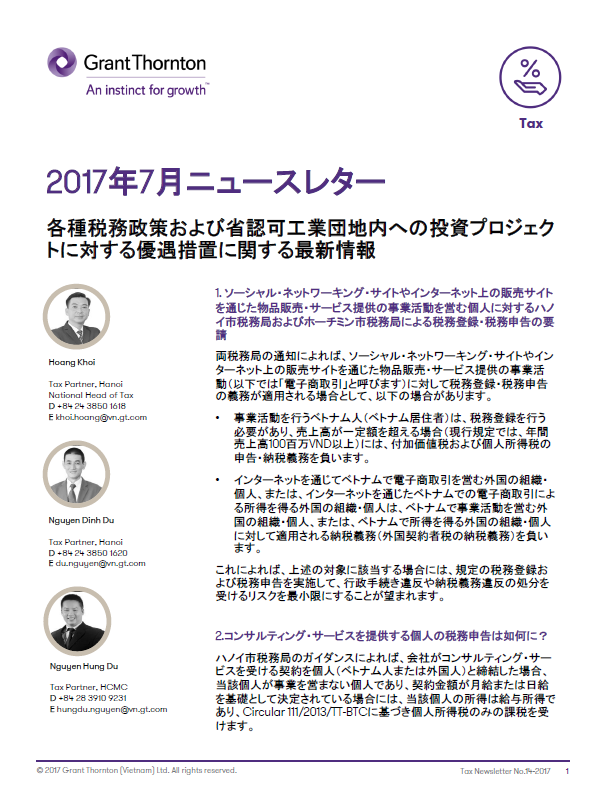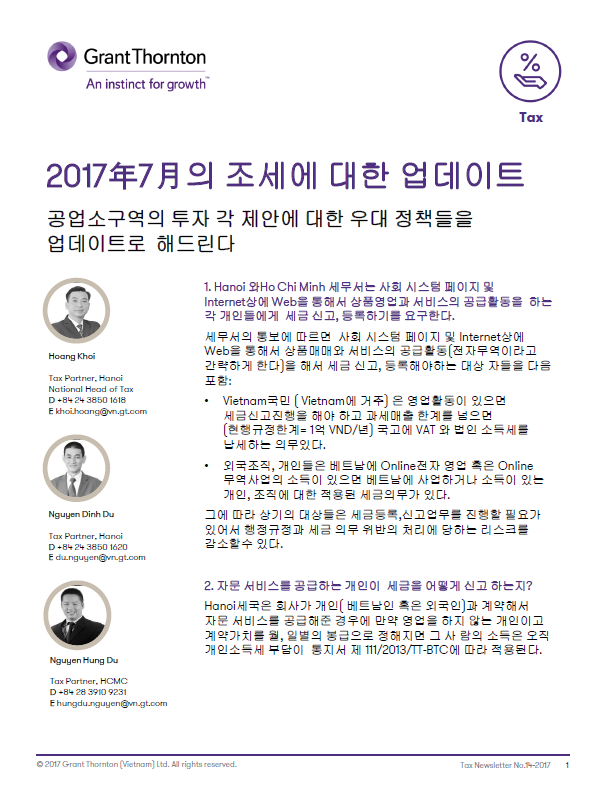-
International Financial Reporting Advisory Services
IFRS reporting advisory serivces of Grant Thornton are carried out by our dedicated team with expertise in IFRS implementation.
-
Audit Services
• Statutory audit • Review of financial statements and financial information • Agreed-upon procedures • FRAS services • Compilation of financial information • Reporting accountant • Cross-border audit • US GAAP audit
-
Audit Quality
We have various methods of monitoring our system of quality control and engagement quality, including real-time involvement of coaches and national office personnel on select audit engagements, reviews of issuer audit engagements prior to archiving by someone outside of the engagement team, and internal inspections of assurance engagements and the system of quality control.
-
Audit Approach
Audit Approach
-
Licensing services
Licensing services
-
International tax planning
Our extensive international network provides us with significant resources to meet all your expansion goals. We strive to develop commercially focused and tailored tax strategies to minimise tax exposures and maximise business efficiency.
-
Expatriate tax planning
We have a broad knowledge base and skills to assist you keep your personal income taxes to a legitimate and reasonable level, while remaining compliant with legislation. We can develop a personalised package for each key employee to take maximum advantage of the exemptions and incentives available.
-
Tax advisory
We will review the proposed business model and transactions and advise on tax implications and recommendations to optimize the tax opportunities under the local regulations and treaties which Vietnam entered into. Furthermore, we coordinate with our GT global tax team to provide a comprehensive tax advisory for the countries involved in the business model and transactions.
-
Tax compliance services
This service is designed to assist enterprises to cope with the statutory tax declaration requirements in line with the Vietnamese tax laws as well as the frequent changes and updates in tax laws.
-
Tax health check
Our Tax Health Check involves a high-level review of specific tax areas to highlight the key issues that need to be rectified in order to reduce tax risks. Through our extensive experience, we have identified key risk areas in which many enterprises are not fully compliant or often overlook potential tax planning opportunities. Our tax health check service represents a cost-effective method to proactively manage risks and reduce potential issues arising as a result of a tax inspection.
-
Transfer Pricing
Transfer pricing is a pervasive tax issue among multinational companies. In Vietnam, the tax authorities require special documentation to report related party transactions. Compliance with transfer pricing regulations is an important aspect of doing business effectively in Vietnam as failure to do so may result in significant penalties.
-
Tax due diligence
We conduct tax due diligence reviews of target companies to analyse their tax exposure and position in relation to acquisitions, mergers or consolidations. We are able to integrate this service with our Advisory Services department in order to offer a comprehensive, holistic due diligence review.
-
Customs and international trade
Our experienced professionals can help you manage customs issues more effectively through valuation planning and making use of available free trade agreements. We also assist Clients in optimising their customs procedures by making use of potential duty exemptions and efficient import-export structures. Risk mitigation activities include customs audit defense and compliance reviews.
-
M&A Transaction
We advise numerous foreign investors on efficient tax structures for their investments. Our experience allows you to consider all the options and set up a corporate structure that meets both operational and tax efficiency requirements. In short, the structure that is best for you.
-
Industrial Zones – Picking A Location For Your Business
Grant Thornton Vietnam’s one-stop services are designed to provide comprehensive support to both new and current investors who are planning to expand or restructure their business in Vietnam. Our professionals have established strong working relationships with landlords, property developers and authorities at various localities. With extensive experiences in liaison with the relevant agencies, we offer assistance including negotiation on land rental rates and efficient management of licensing process. Our customized and flexible solutions can bring benefits of cost efficient location, accelerate licensing process, and optimize tax opportunities while remaining in compliance with legislation.
-
Tax Audit Support
Tax audit support services provide comprehensive assistance to your business in Vietnam. Recent tax practices have shown the general tendency of launching routine tax audit on yearly basis. Tax authorities have been effectively using more sophisticated methods to identify target entities from across different industry sectors.
-
Business Risk Services
Business Risk Services
-
Transaction Advisory Services
Transaction Advisory Services
-
Valuation
Valuation
-
Business consulting services
Finance Management Advisory
-
Accounting services
Accounting services
-
Taxes compliance within outsourcing
Taxes compliance within outsourcing
-
Payroll, personal income tax and labor compliance
Payroll, personal income tax and labor compliance
-
Secondments/Loan staff services
Secondments/Loan staff services
-
Compilation of the financial and non-financial information
Compilation of the financial and non-financial information
-
Accounting systems review and improvement
Accounting systems review and improvement
-
Initial setting-up for accounting and taxes systems
Initial setting-up for accounting and taxes systems
-
Management accounting and analysis
Management accounting and analysis
-
Comprehensive ERP system solution
ERP software is a tool for business operations, production management, order processing and inventory in the business process. Today, ERP software for small and medium businesses has been greatly improved to help businesses manage their business better. The article below will answer all relevant information about what ERP software is and offer the most suitable ERP solution for businesses. Let's follow along!
-
Analyze Business Administration data
We believe in the value that data can bring to the success and development of every business. Our team helps design data architecture supported by tools, to support business governance and provide useful information to management.
-
Financial reporting compliance solution package
Putting financial issues at the heart, this service helps ensure that financial reports for customers comply with both the requirements of Vietnamese accounting regulations and standards (VAS) as well as reporting standards. international finance (IFRS).
-
Third-party ERP extensions
ERP is a long-term solution that requires long-term travel, not short-term. We understand that many businesses cannot deploy the entire ERP system at once due to many different reasons, instead businesses can deploy each part. Over time, these solutions can be expanded to accommodate improved business processes or can even link completely new processes across different departments.
-
Localize, deploy and rebuild the project
Quite a few ERP projects need to be implemented according to current Vietnamese requirements and regulations, but still comply with common international business requirements. These projects need some improvements and adjustments in the right direction.
-
Consulting on technology solutions
We support the selection and implementation of the most suitable solutions, ensuring business efficiency and performance. We will work closely with customers to plan, evaluate and implement the right technology investment strategies and solutions to meet the development needs of businesses.

-
Offshore company establishment service
Using the offshore company model will facilitate the owner in the process of transaction and expand overseas markets, take advantage of the tax policy with many incentives and protect the value of the family enterprise's assets.
-
Private Trust Advisory
The development of the economy with many modern financial instruments has brought many advantages and opportunities for the enterprises, but there are still certain potential risks in any type of business. So how to protect your asset value with an appropriate company structure while stay compliance with relevant regulations?
-
Our values
We have six CLEARR values that underpin our culture and are embedded in everything we do.
-
Learning & development
At Grant Thornton we believe learning and development opportunities help to unlock your potential for growth, allowing you to be at your best every day. And when you are at your best, we are the best at serving our clients
-
Global talent mobility
One of the biggest attractions of a career with Grant Thornton is the opportunity to work on cross-border projects all over the world.
-
Diversity
Diversity helps us meet the demands of a changing world. We value the fact that our people come from all walks of life and that this diversity of experience and perspective makes our organisation stronger as a result.
-
Contact us
Contact us
-
Available positions
Experienced hires
-
Available positions
Available positions
1. Hanoi and Ho Chi Minh Tax Departments require individuals conducting business activities via social networks and online trading websites to perform tax registration and declaration
According to Tax Departments, the taxpayers subject to tax registration and tax declaration obligations with regard to the business of selling goods and providing services via online social networks or online trading websites (referred as “e-commerce”) are listed as follows:
- Vietnamese citizens (residing in Vietnam) engaged in such business activities must perform tax registration and if the turnover from selling of goods exceeds the taxable turnover threshold (current turnover threshold being up to VND 100 million per year) are obliged to perform tax declaration as well as to pay Value Added Tax (VAT) and Personal Income Tax (PIT) to State Budget.
- Foreign organizations or individuals engaged in e-commerce business in Vietnam or earning income from e-commerce business in Vietnam must perform the tax obligations applicable to foreign organizations or individuals operating business or earning income in Vietnam.
Accordingly, the above-mentioned taxpayers should perform tax registration and tax declaration obligations to minimize the risk of violating administrative procedures and tax obligations.
2. Tax declaration performed by individuals providing consulting services
Hanoi Tax Department provides guidance on the case where a company contracts with an individual (either Vietnamese or foreigner) to provide consulting services. If this is a non-commercial individual, given that the value of the contract is determined on the basis of monthly or daily salary, such income (which is defined as “salary” or “wage”) is only subject to Personal Income Tax (PIT) in accordance with Circular 111/2013/TT-BTC.
On the contrary, if this is a commercial individual, the income from providing consulting services is regarded as operating income, which is subject to Personal Income Tax (PIT) and Value Added Tax (VAT) as provided in Circular 92/2015/TT-BTC.
With regards to The General Department of Taxation’s perspective on businessperson or businesspeople, Point 1, Article 6 of Commercial Law No. 36/2005/QH11 dated 14th June 2005 stipulates:
“Traders include lawfully established economic organizations and individuals that conduct commercial activities in an independent and regular manner with business registration”
Please note that the tax rate and tax calculation method differ between income from individual salary/ wage and individual business operation.
Grant Thornton Vietnam is willing to provide detailed advice on tax declaration solutions applicable to each type of transaction made by clients upon request.
3. Foreign Contractor Tax for advertising and online consulting activities
Advertising activities
The General Department of Taxation issued the Official Letter providing guidance on the case where a Vietnamese company contracts with a foreign company to run advertisements for its products to be posted on a foreign magazine. Such advertising service is exempt from Foreign Contractor Tax (FCT) according to Circular No. 103/2014/TT-BTC. It should also be noted that this guidance is not applicable for online advertising and online marketing.
Online consulting activities
Hanoi Tax Department issued the Official Letter providing guidance on Foreign Contractor Tax obligations for online consulting activities. Pursuant to Circular No. 103/2014/TT-BTC, in cases where the foreign contractor provides legal consulting, market development consulting, technical consulting, etc. for a company via such communication methods as email, telephone, software and other online communication applications, such services are subject to Foreign Contractor Tax (FCT) including Value Added Tax (VAT) and Corporate Income Tax (CIT).
4. Preferential policies on industrial cluster development
The Government has issued a series of preferential policies on industrial cluster development in Decree No.68/2017/ND-CP, in which:
- Production and business investment projects in industrial clusters will be exempt from land lease fees in 7 years and enjoy other incentives in accordance with the legal regulations.
- Investment projects on industrial zones’ technical infrastructure will be exempt from land rent for 11 years. They will also be considered eligible for credit loans from the State, at a level not exceeding 70% of their total investment, along with enjoying other preferences under the current provisions of law.
- Incentives for trade village industrial clusters:
- Business and investment projects in trade village industrial clusters will enjoy 11-year-land lease exemption and be considered to borrow State credits under 70% of their total investment capital; together with other incentives and supports for industrial clusters.
- Technical infrastructure business projects will be exempt from 15-year-land lease fees and considered for State credit loans up to 70% of their total investment; together with other incentives and supports for industrial clusters.
In addition, Decree 68 also provides guidelines on encouraged investment fields and industries; expansion of investor’s rights in technical infrastructure business projects; cases of building permit exemption, etc.
The Decree takes effect from 15th July 2017 replacing Decision No.105/2009/QD-TT dated 19th August 2009.
Update on tax regulations and preferential policies regarding industrial cluster development
Update on the tax regulations and preferential policies regarding industrial cluster development
Update on the tax regulations and preferential policies regarding industrial cluster development






